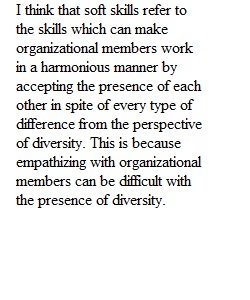


Q What are Soft Skills? You may hear references in other classes to “soft skills” – this is definitely a hot topic among local human resource professionals seeking to hire qualified candidates for their open positions. You may have also heard the saying, “hire for the attitude, train for the skill” or something similar. This is a reference to soft skills. Soft skills have also been called "common skills", "essential skills" and "transferable skills" because they are valuable to a variety of employment opportunities. High-quality soft skills can set you apart from candidates who have a similar background, experience, or technical knowledge. Take a look at a career posting of interest to you and note the required and preferred skills the employer seeks. Usually they are a mix of technical skills and soft skills. Some of the top in-demand soft skills among local employers include communication, professionalism, time management, teamwork, problem solving, and critical thinking. Much of our customer service curriculum revolves around these topics so take advantage of the opportunity you have this term to develop your skill-set that can support even greater career success. Below are links to two videos about soft skills. Please watch both videos, then summarize your understanding of soft skills. Answer these questions: What are soft skills? Why are they important in today's work world? What are your strongest soft skills? Where can you improve? Your summary should be 100 words minimum. https://www.youtube.com/watch?v=Tiy2LONr050 (Links to an external site.) https://hbr.org/sponsored/2017/09/the-5-skills-employers-seek-in-todays-digital-economy
View Related Questions